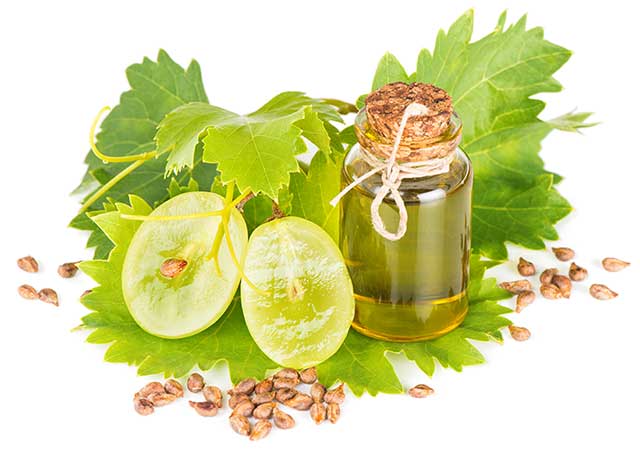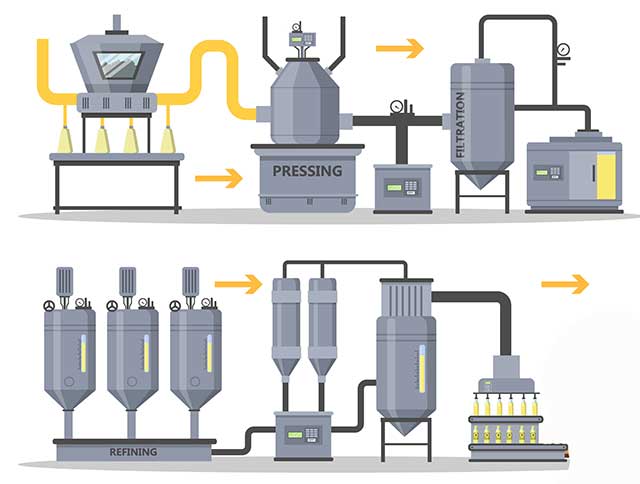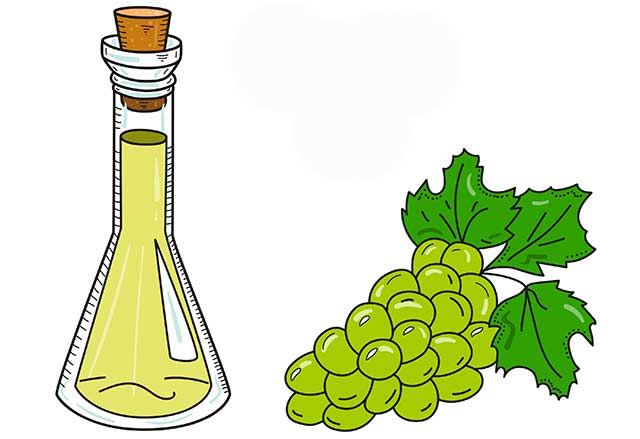It is easy to hear claims that grapeseed oil is a “heart healthy” cooking oil.
However, is this true or is it purely marketing?
In this article, we review the research on grapeseed oil to determine whether it deserves its reputation as a healthy cooking oil.
What Is Grapeseed Oil?
As the name may suggest, grapeseed oil is a cooking oil made from grape seeds.
Interestingly, this oil is a by-product of the winemaking industry.
In the past, after wine producers finished juicing the grapes, millions of seeds would go to waste.
However, industry soon found a use for these leftover seeds and started using them to produce grapeseed oil, initially for use in beauty products (1).
Soon after, the potential uses for these seeds doubled as researchers realized they could use the seeds to make edible cooking oil (2).
In the present day, marketing efforts place grapeseed oil as a healthy cooking oil with cardiovascular benefits.
These health claims come from the fact that the oil has a high smoke point and polyunsaturated fat content.
While this may sound good in theory, the crucial test is how grapeseed oil performs during high heat cooking, and we will get to that shortly.
How Is Grapeseed Oil Made?
Before we look into grapeseed oil’s nutritional properties, here is a quick examination of how manufacturers produce it.
Firstly, there are two distinct methods for producing grapeseed oil;
- Cold-pressing: preserves more nutritional value from the seeds, but it is more expensive to produce. The vast majority of cold-pressed grapeseed oil appears in skin and beauty products.
- Solvent extraction: this method removes almost all beneficial properties from the oil, but many manufacturers prefer it due to economies of scale (it is cheap). Practically all commercial cooking oils are refined in this way.
Cold-Pressing
Cold-pressed grapeseed oil which involves (3);
- Removing skins and stems from the seeds
- Pressing the seeds—without heat—to extract their oil
- Purification of the resulting oil via sedimentation
- Filtering the oil and then bottling it
Solvent Extraction
The solvent extraction process uses heat and chemicals such as hexane. This process involves (4);
- Washing and oven-drying the seeds
- Crushing the seeds and pressing them into a “cake”
- These seeds are then treated with hexane to extract further oil
- The oil then goes through a distillation, bleaching, and deodorizing phase to remove chemical residues
The majority of grapeseed oil for sale in stores has been through the solvent extraction process.
Nutrition Facts
As an isolated oil, grapeseed oil provides little more than a source of fat.
However, for reference purposes here is a summary of the main nutritional values per tablespoon serving (5);
Calories and Macronutrients
| Calories / Macronutrient | Amount (kcal/grams) |
| Calories | 119 kcal |
| Carbohydrate | 0 g |
| Fat | 13.5 g |
| Saturated Fat | 1.3 g |
| Monounsaturated Fat | 2.2 g |
| Polyunsaturated Fat | 9.4 g |
| Omega-3 | 13.5 mg |
| Omega-6 | 9395 mg |
| Protein | 0 g |
As shown in the table, grapeseed oil is predominantly a source of polyunsaturated fat, mainly omega-6 fatty acids.
Grapeseed oil contains small amounts of monounsaturated fat and an even smaller serving of saturated fat.
Vitamins and Minerals
| Nutrient | Amount (% RDI) |
| Vitamin E | 19% |
The only vitamin or mineral of note in grapeseed oil is vitamin E, with one tablespoon providing 19% of the RDI.
Smoke Point
The smoke point of grapeseed oil is approximately 421°F (216°C).
However, it is worth noting that the smoke point of an oil is not a constant throughout cooking, and it can change as the oil breaks down.
The best measure of a cooking fat’s properties is oxidative stability.
Is Grapeseed Oil a Healthy Cooking Oil?
Rather than the nutrition profile or smoke point, what really matters is whether or not grapeseed oil has positive or negative effects on health.
To determine this, here is an overview of what the studies show.
Benefits
First, we will look at the benefits.
1) Provides a Good Source of Vitamin E
As previously mentioned, grapeseed oil is a good source of vitamin E, containing 19% of the RDI in every tablespoon.
Vitamin E functions as an antioxidant in the body, and it may help to attenuate oxidative stress and reduce inflammation in the body (6, 7).
Additionally, studies show that vitamin E tocopherols help to protect the fats in oils against oxidation (8).
2) May Reduce Platelet Aggregation
A study featuring 30 healthy participants found that daily consumption of grapeseed oil reduced platelet aggregation.
In simple English, this means that the blood was less likely to thicken and “clump together”.
This means the grapeseed oil may have a blood-thinning effect similar to how aspirin works; thinner blood means a reduced risk of blood clots (9).
3) Contains Phenolic Compounds
Cold-pressed grapeseed oil can contain reasonably large quantities of phenolic compounds (10).
These polyphenols may hold benefits for the human body, and they can help to protect oils from oxidation.
However, oils tend to lose large amounts of these compounds when they undergo refining processes such as bleaching and deodorization. As a result, the regular grapeseed oil on store shelves is unlikely to contain these compounds in significant numbers (11).
Negatives
While grapeseed oil does have some potential benefits, unfortunately, they are dwarfed by the negatives.
Here are some of the main drawbacks of using the oil that research has identified.
1) Grapeseed Oil Easily Oxidizes During Heat Exposure
Oxidative stability is the most important consideration, and grapeseed oil appears to fail it.
Firstly, grapeseed oil is predominantly polyunsaturated fat, which is the least stable fatty acid. Studies also confirm the oil itself has poor oxidative stability (12, 13).
In other words, the fatty acids break down with exposure to heat, which results in the formation of harmful chemicals that can damage our health.
In one recent study, an independent test laboratory heated ten different commercial cooking oils to a temperature of 180°C (356°F).
These oils included; olive oil, extra virgin olive oil, virgin olive oil, canola oil, avocado oil, rice bran oil, sunflower oil, peanut oil, coconut oil, and finally grapeseed oil.
At the one hour point, grapeseed oil contained more polar compounds (oxidation products) than any other oil. It also displayed lower oxidative stability than all nine other oils (14).
The best-performing oils were coconut, extra virgin olive, and peanut oil.
We can see an illustration of these results in the graph below;
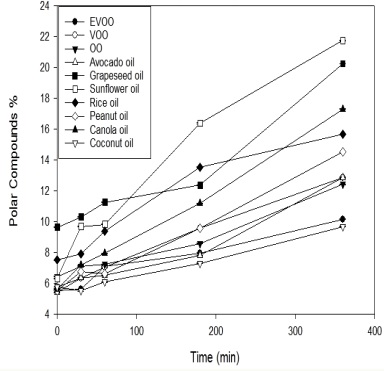
2) Contains Trans Fats
By now, the whole world knows that trans fats are detrimental to our health.
However, it is not only trans fat products that can contain these harmful fats; vegetable oils do too.
In the laboratory test previously discussed, the researchers measured the trans fat levels in the commercial cooking oils.
Before heat exposure, grapeseed oil already contained more than 1% trans fats. Exposure to 240°C heat resulted in the formation of more trans fats.
Compared to all nine other cooking oils, grapeseed oil contained the most trans fats both before and after exposure to high heat.
The graph below shows how grapeseed oil compares to other cooking oils for trans fat formation;
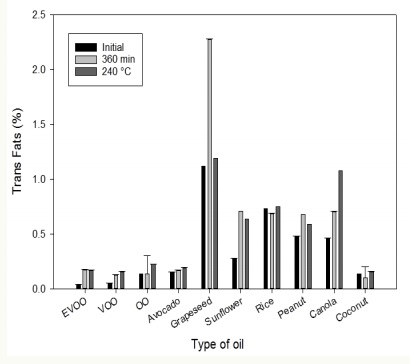
3) Excessive Amounts of Omega-6 May Cause Health Problems
Omega-6 fatty acids are essential to our health, and they are available in a wide variety of foods.
However, we only require them in small amounts, and seed oils like grapeseed are a substantial source of these fats. For example, a tablespoon of oil can be like eating hundreds of seeds at one time.
On the negative side, research suggests that an excessive dietary intake of omega-6 could potentially cause problems.
One study suggests that a high omega-6 diet may cancel the anti-inflammatory benefits of omega-3 in the diet (15).
Furthermore, very few people—especially children and the elderly—consume enough EPA and DHA omega-3 fatty acids. At the same time, most individuals have an imbalanced intake of omega-6 to omega-3 fats. Some studies suggest that this may promote inflammation (16, 17, 18).
Since the majority of people already consume high amounts of omega-6 and not enough omega-3, regularly consuming added fats high in omega-6 like grapeseed oil probably isn’t ideal.
4) May Still Contain Traces of Hexane
The solvent hexane plays a role in the solvent extraction process used to produce grapeseed oil.
After the extraction of the oil, producers remove the hexane from the oil before it goes out to sale.
However, some trace amounts of hexane residues may remain after this.
On this note, there is a ‘maximum residue limit’ (MRL) for the amount of hexane which is acceptable.
A recent study also showed that although 36 out of 40 commercial vegetable oil samples contained hexane, none of them exceeded the MRL (19).
In short, there is no evidence that these residues can cause harm, but it is something that people may wish to be aware of.
Is Grapeseed Oil Safe For High Heat Cooking?
While grapeseed oil may have a few positives like vitamin E and potential phenolic contents, the research is clear; it is not a healthy cooking oil.
It is well established that oils high in polyunsaturated fat have poor heat stability.
Furthermore, independent lab tests show grapeseed oil creates more oxidation products and more trans fats than other common oils.
For these reasons, it is a good idea to leave the grapeseed oil on store shelves and seek out healthier alternatives.
Healthier Alternatives
The most evidence-based cooking oil at present is extra virgin olive oil (EVOO).
EVOO is very heat stable, full of beneficial compounds, and has a wide range of positive research behind it.
Other options that are stable at high heat include oils like avocado, animal fats, nut oils (except walnut) and coconut oil.

